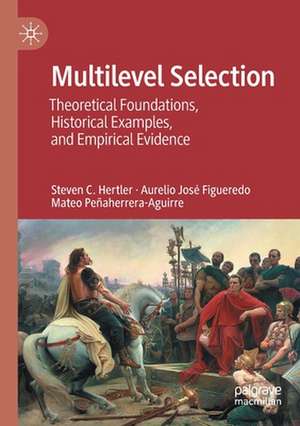Multilevel Selection: Theoretical Foundations, Historical Examples, and Empirical Evidence
Autor Steven C. Hertler, Aurelio José Figueredo, Mateo Peñaherrera-Aguirreen Limba Engleză Paperback – 3 sep 2021
This book embeds a novel evolutionary analysis of human group selection within a comprehensive overview of multilevel selection theory, a theory wherein evolution proceeds at the level of individual organisms and collectives, such as human families, tribes, states, and empires. Where previous works on the topic have variously supported multilevel selection with logic, theory, experimental data, or via review of the zoological literature; in this book the authors uniquely establish the validity of human group selection as a historical evolutionary process within a multilevel selection framework.
Select portions of the historical record are examined from a multilevel selectionist perspective, such that clashing civilizations, decline and fall, law, custom, war, genocide, ostracism, banishment, and the like are viewed with the end of understanding their implications for internal cohesion, external defense, and population demography. In doing so, its authors advance the potential for further interdisciplinary study in fostering, for instance, the convergence of history and biology. This work will provide fresh insights not only for evolutionists but also for researchers working across the social sciences and humanities.
| Toate formatele și edițiile | Preț | Express |
|---|---|---|
| Paperback (1) | 729.23 lei 6-8 săpt. | |
| Springer International Publishing – 3 sep 2021 | 729.23 lei 6-8 săpt. | |
| Hardback (1) | 734.44 lei 6-8 săpt. | |
| Springer International Publishing – 3 sep 2020 | 734.44 lei 6-8 săpt. |
Preț: 729.23 lei
Preț vechi: 889.30 lei
-18% Nou
Puncte Express: 1094
Preț estimativ în valută:
139.55€ • 144.87$ • 116.37£
139.55€ • 144.87$ • 116.37£
Carte tipărită la comandă
Livrare economică 22 martie-05 aprilie
Preluare comenzi: 021 569.72.76
Specificații
ISBN-13: 9783030495220
ISBN-10: 3030495221
Pagini: 359
Ilustrații: LII, 359 p. 19 illus., 10 illus. in color.
Dimensiuni: 148 x 210 mm
Greutate: 0.49 kg
Ediția:1st ed. 2020
Editura: Springer International Publishing
Colecția Palgrave Macmillan
Locul publicării:Cham, Switzerland
ISBN-10: 3030495221
Pagini: 359
Ilustrații: LII, 359 p. 19 illus., 10 illus. in color.
Dimensiuni: 148 x 210 mm
Greutate: 0.49 kg
Ediția:1st ed. 2020
Editura: Springer International Publishing
Colecția Palgrave Macmillan
Locul publicării:Cham, Switzerland
Cuprins
1. An Intellectual History of Multilevel Selection from Darwin to Dawkins.- 2. An Intellectual History of Multilevel Selection: Reformulation and Resuscitation.- 3. Theoretical Foundations of Multilevel Selection Among Humans.- 4. Aggregation: From Ethnic and Regional Competition to Group Selection at the Level of States and Nations.- 5. Growth, Maintenance, Control, and Competition.- 6. Decline.- 7. The Collapse and Regeneration of Complex Societies.- 8. Chimpanzee Intercommunity Conflict: Fitness Outcomes, Power Imbalances, and Multilevel Selection.- 9. Lethal Intergroup Competition in Non-State Societies: From Small-Scale Raids to Large-Scale Battles.- 10. The Sociopolitical Integrity of the Roman State: Intragroup Competition, Intergroup Competition, and Economic Dynamics.- 11. Dear Enemies: French and English Power Ratios.- 12. Expansion, Fission, and Decline: England and Anglo America.
Notă biografică
Steven C. Hertler is a licensed examining psychologist and Adjunct Professor of Psychology at the College of Saint Elizabeth, USA.
Aurelio José Figueredo is Professor of Psychology, Family Studies and Human Development at the University of Arizona, USA. Dr. Figueredo also serves as Director of the Ethology and Evolutionary Psychology (EEP) Laboratory.
Mateo Peñaherrera-Aguirre is a Ph.D. candidate in the Cognitive and Neural Systems Program and a researcher at the University of Arizona, USA.
Textul de pe ultima copertă
“Multilevel selection is the only logically coherent and empirically supported theory that can explain human ultrasociality—the capacity of humans to cooperate in huge groups of genetically unrelated individuals. Yet influential critics continue to reject it. This timely and important book is a welcome entrant to this intense scientific debate. The stakes are high, because understanding how cooperation evolved and can be maintained is key to solving the Tragedy of the Commons problems at both local and global levels.”
— Peter Turchin, author of Ultrasociety (2015) and Professor at the University
of Connecticut, USA
This book embeds a novel evolutionary analysis of human group selection within a comprehensive overview of multilevel selection theory, a theory wherein evolution proceeds at the level of individual organisms and collectives, such as human families, tribes, states,and empires. Where previous works on the topic have variously supported multilevel selection with logic, theory, experimental data, or via review of the zoological literature; in this book the authors uniquely establish the validity of human group selection as a historical evolutionary process within a multilevel selection framework.
Select portions of the historical record are examined from a multilevel selectionist perspective, such that clashing civilizations, decline and fall, law, custom, war, genocide, ostracism, banishment, and the like are viewed with the end of understanding their implications for internal cohesion, external defense, and population demography. In doing so, its authors advance the potential for further interdisciplinary study in fostering, for instance, the convergence of history and biology. This work will provide fresh insights not only for evolutionists but also for researchers working across the social sciences and humanities.
Steven C. Hertler is a licensed examining psychologist and Adjunct Professor of Psychology at the College of Saint Elizabeth, USA.
Aurelio José Figueredo is Professor of Psychology, Family Studies and Human Development at the University of Arizona, USA. Dr. Figueredo also serves as Director of the Ethology and Evolutionary Psychology (EEP) Laboratory.
Mateo Peñaherrera-Aguirre is a Ph.D. candidate in the Cognitive and Neural Systems Program and a researcher at the University of Arizona, USA.
Caracteristici
Provides new empirical evidence for human group selection Demonstrates how groups balance external threat against internal dissolution Accomplishes a comprehensive treatment of multilevel selection theory Follows the principles of gene-culture coevolution in positing a dynamic interplay between cultural and genetic selection
